Psychology in Health and Social Care: Theories and Applications
VerifiedAdded on 2021/02/19
|10
|2980
|111
Report
AI Summary
This report examines the application of psychology within health and social care, focusing on lifespan development theories, social and biological factors that influence human behavior, and the significance of social roles. The report begins with an introduction to psychology's role in promoting healthy behaviors and preventing disease. Task 1 discusses theories of lifespan development, including nature vs. nurture, continuity vs. discontinuity, and static vs. dynamic theories, along with various psychological perspectives such as psychodynamic, behavioral, cognitive, and humanistic approaches. Task 2 explores the impact of social factors (family, peer groups, education, culture, social exclusion) and biological factors (genetics, neuron degeneration) on human behavior, as well as the influence of social roles in health and social care settings. Task 3 focuses on the application of psychological principles in health and social care, including the use of behavior theory and cognitive behavior therapy to address mental disorders and promote behavioral change. The report concludes by emphasizing the importance of psychological theories in understanding the relationship between individuals and their environment within health and social care settings.
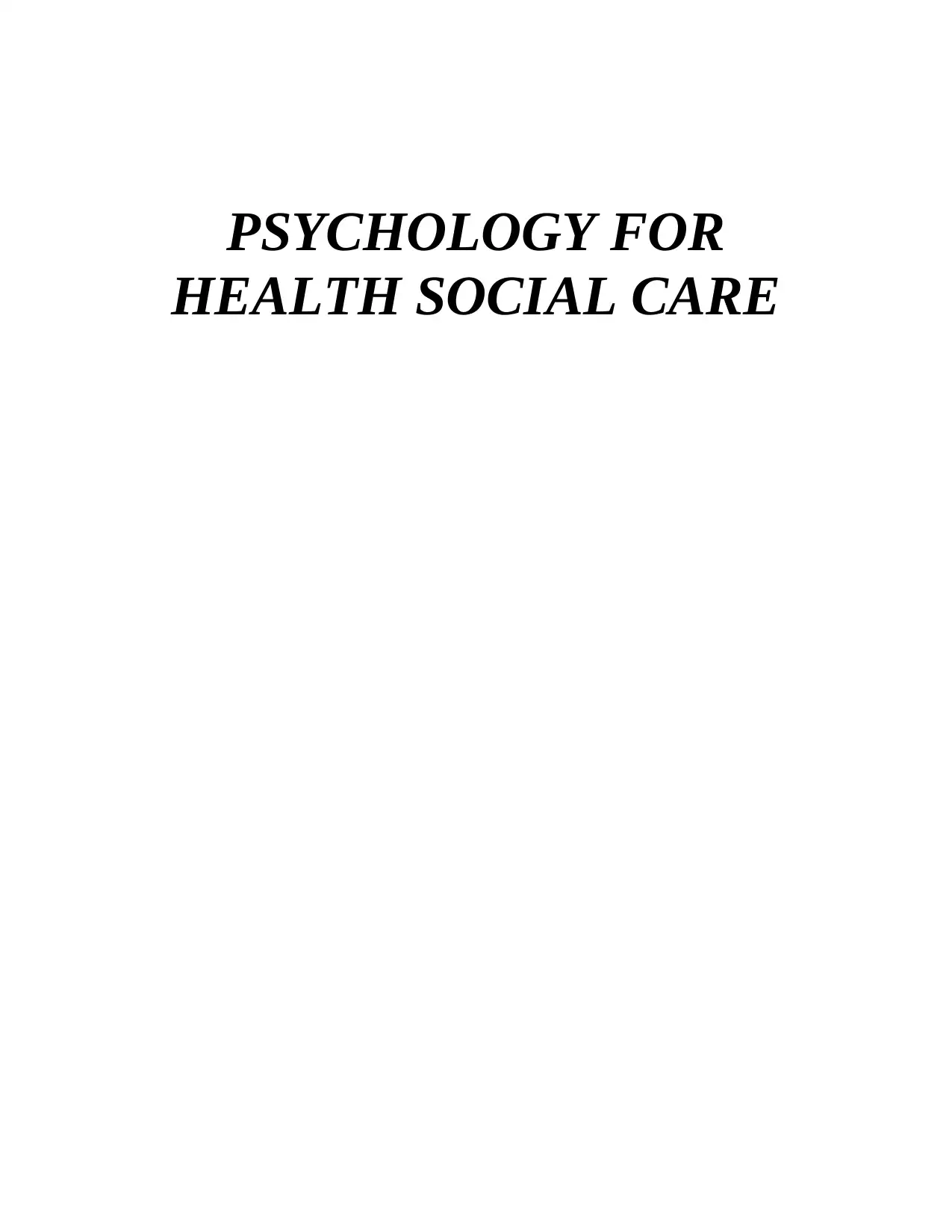
PSYCHOLOGY FOR
HEALTH SOCIAL CARE
HEALTH SOCIAL CARE
Paraphrase This Document
Need a fresh take? Get an instant paraphrase of this document with our AI Paraphraser
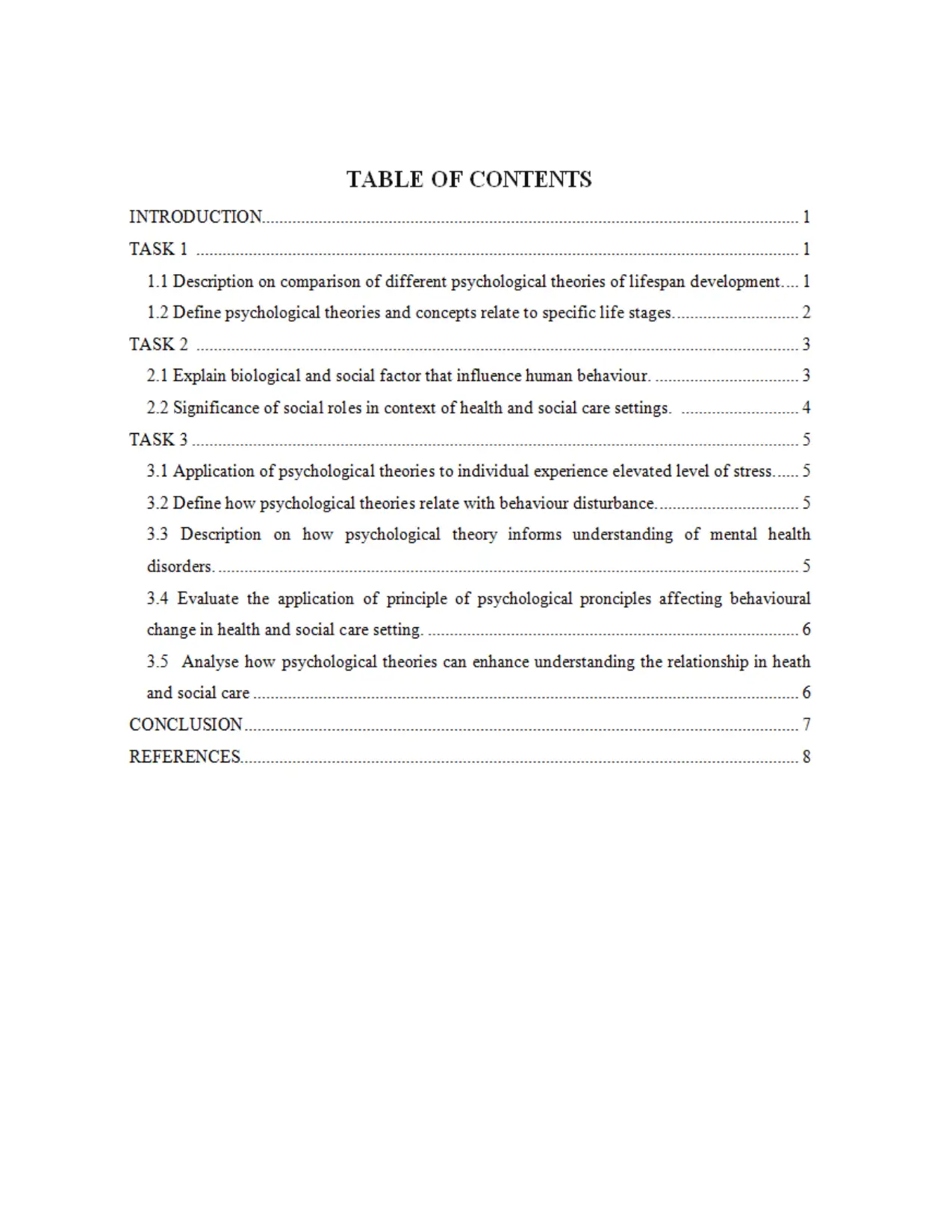
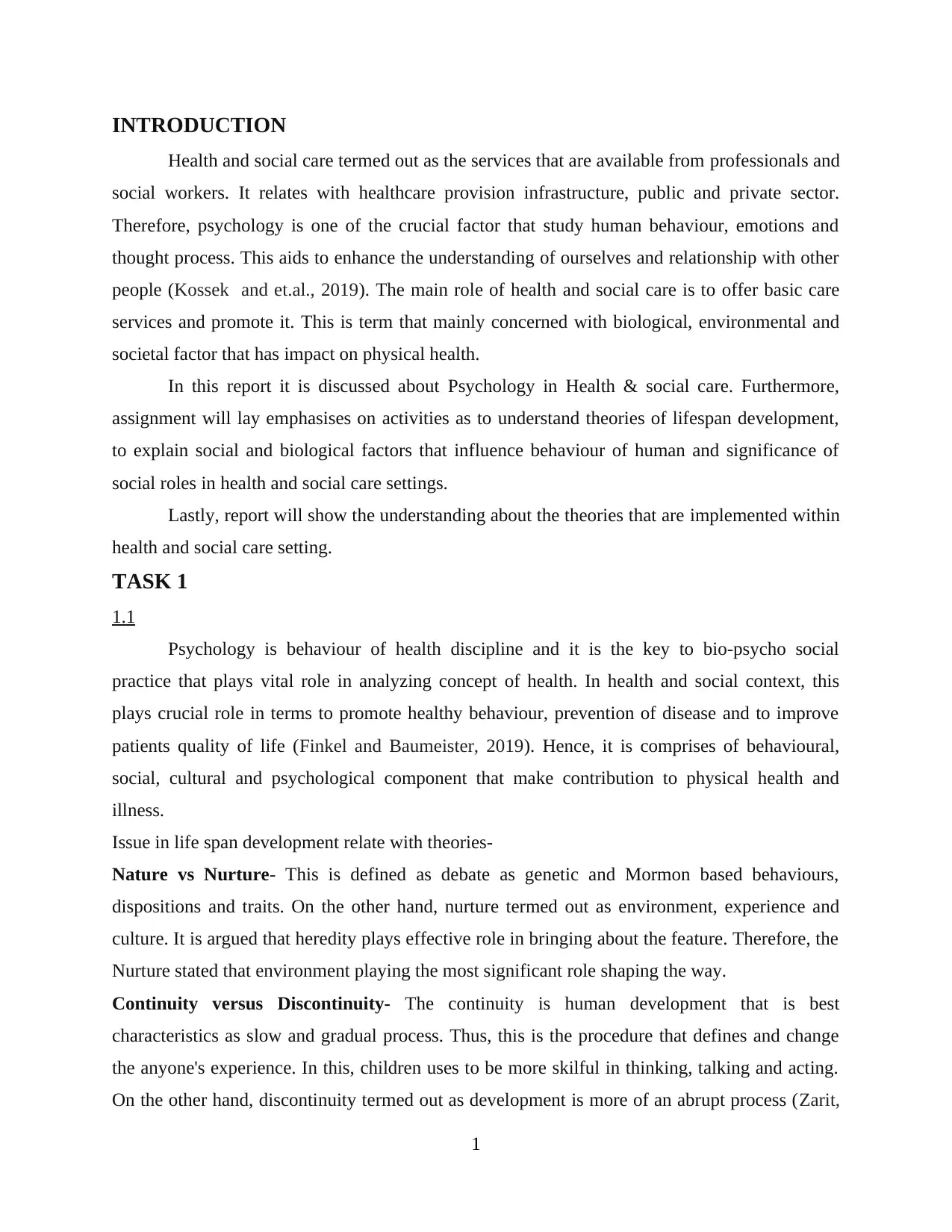
INTRODUCTION
Health and social care termed out as the services that are available from professionals and
social workers. It relates with healthcare provision infrastructure, public and private sector.
Therefore, psychology is one of the crucial factor that study human behaviour, emotions and
thought process. This aids to enhance the understanding of ourselves and relationship with other
people (Kossek and et.al., 2019). The main role of health and social care is to offer basic care
services and promote it. This is term that mainly concerned with biological, environmental and
societal factor that has impact on physical health.
In this report it is discussed about Psychology in Health & social care. Furthermore,
assignment will lay emphasises on activities as to understand theories of lifespan development,
to explain social and biological factors that influence behaviour of human and significance of
social roles in health and social care settings.
Lastly, report will show the understanding about the theories that are implemented within
health and social care setting.
TASK 1
1.1
Psychology is behaviour of health discipline and it is the key to bio-psycho social
practice that plays vital role in analyzing concept of health. In health and social context, this
plays crucial role in terms to promote healthy behaviour, prevention of disease and to improve
patients quality of life (Finkel and Baumeister, 2019). Hence, it is comprises of behavioural,
social, cultural and psychological component that make contribution to physical health and
illness.
Issue in life span development relate with theories-
Nature vs Nurture- This is defined as debate as genetic and Mormon based behaviours,
dispositions and traits. On the other hand, nurture termed out as environment, experience and
culture. It is argued that heredity plays effective role in bringing about the feature. Therefore, the
Nurture stated that environment playing the most significant role shaping the way.
Continuity versus Discontinuity- The continuity is human development that is best
characteristics as slow and gradual process. Thus, this is the procedure that defines and change
the anyone's experience. In this, children uses to be more skilful in thinking, talking and acting.
On the other hand, discontinuity termed out as development is more of an abrupt process (Zarit,
1
Health and social care termed out as the services that are available from professionals and
social workers. It relates with healthcare provision infrastructure, public and private sector.
Therefore, psychology is one of the crucial factor that study human behaviour, emotions and
thought process. This aids to enhance the understanding of ourselves and relationship with other
people (Kossek and et.al., 2019). The main role of health and social care is to offer basic care
services and promote it. This is term that mainly concerned with biological, environmental and
societal factor that has impact on physical health.
In this report it is discussed about Psychology in Health & social care. Furthermore,
assignment will lay emphasises on activities as to understand theories of lifespan development,
to explain social and biological factors that influence behaviour of human and significance of
social roles in health and social care settings.
Lastly, report will show the understanding about the theories that are implemented within
health and social care setting.
TASK 1
1.1
Psychology is behaviour of health discipline and it is the key to bio-psycho social
practice that plays vital role in analyzing concept of health. In health and social context, this
plays crucial role in terms to promote healthy behaviour, prevention of disease and to improve
patients quality of life (Finkel and Baumeister, 2019). Hence, it is comprises of behavioural,
social, cultural and psychological component that make contribution to physical health and
illness.
Issue in life span development relate with theories-
Nature vs Nurture- This is defined as debate as genetic and Mormon based behaviours,
dispositions and traits. On the other hand, nurture termed out as environment, experience and
culture. It is argued that heredity plays effective role in bringing about the feature. Therefore, the
Nurture stated that environment playing the most significant role shaping the way.
Continuity versus Discontinuity- The continuity is human development that is best
characteristics as slow and gradual process. Thus, this is the procedure that defines and change
the anyone's experience. In this, children uses to be more skilful in thinking, talking and acting.
On the other hand, discontinuity termed out as development is more of an abrupt process (Zarit,
1
⊘ This is a preview!⊘
Do you want full access?
Subscribe today to unlock all pages.

Trusted by 1+ million students worldwide
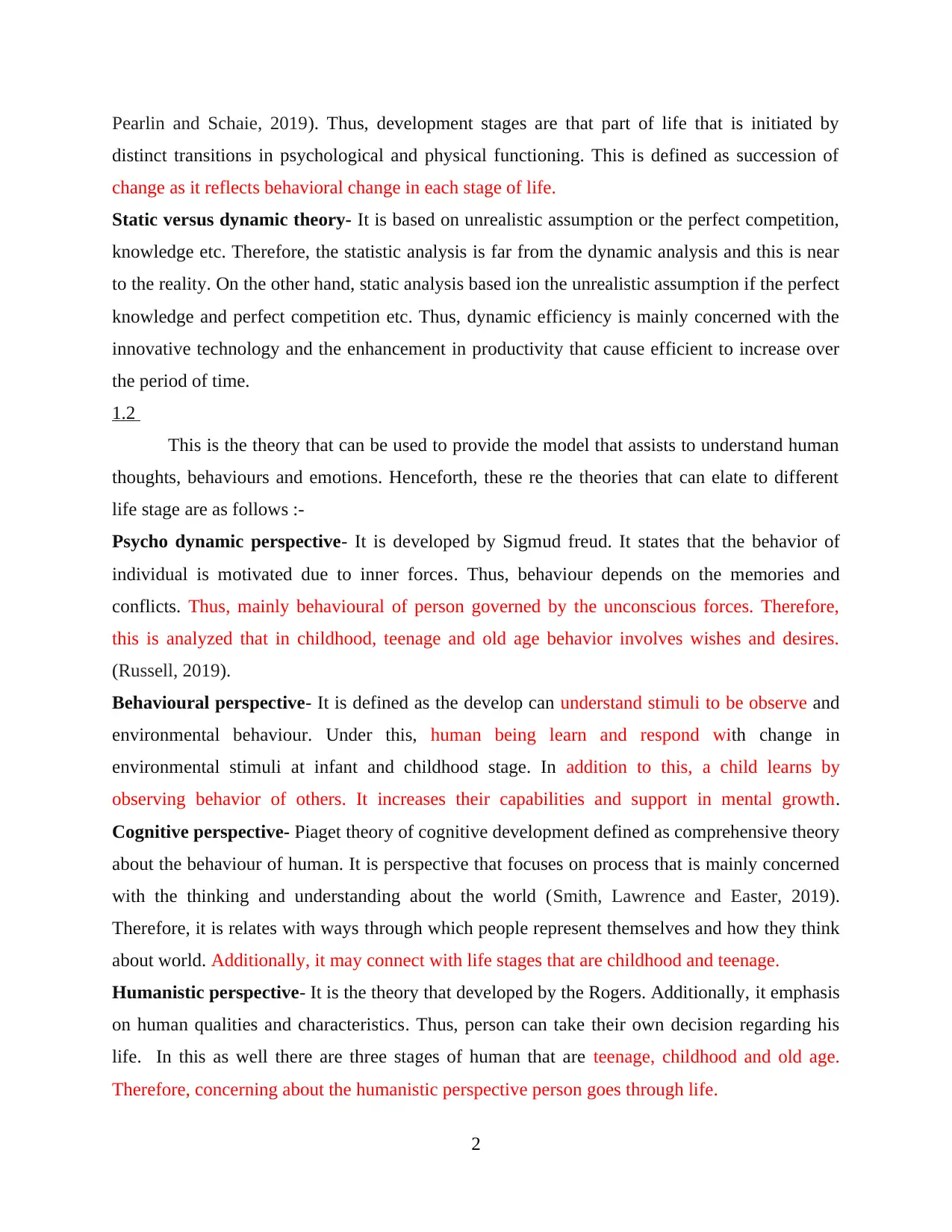
Pearlin and Schaie, 2019). Thus, development stages are that part of life that is initiated by
distinct transitions in psychological and physical functioning. This is defined as succession of
change as it reflects behavioral change in each stage of life.
Static versus dynamic theory- It is based on unrealistic assumption or the perfect competition,
knowledge etc. Therefore, the statistic analysis is far from the dynamic analysis and this is near
to the reality. On the other hand, static analysis based ion the unrealistic assumption if the perfect
knowledge and perfect competition etc. Thus, dynamic efficiency is mainly concerned with the
innovative technology and the enhancement in productivity that cause efficient to increase over
the period of time.
1.2
This is the theory that can be used to provide the model that assists to understand human
thoughts, behaviours and emotions. Henceforth, these re the theories that can elate to different
life stage are as follows :-
Psycho dynamic perspective- It is developed by Sigmud freud. It states that the behavior of
individual is motivated due to inner forces. Thus, behaviour depends on the memories and
conflicts. Thus, mainly behavioural of person governed by the unconscious forces. Therefore,
this is analyzed that in childhood, teenage and old age behavior involves wishes and desires.
(Russell, 2019).
Behavioural perspective- It is defined as the develop can understand stimuli to be observe and
environmental behaviour. Under this, human being learn and respond with change in
environmental stimuli at infant and childhood stage. In addition to this, a child learns by
observing behavior of others. It increases their capabilities and support in mental growth.
Cognitive perspective- Piaget theory of cognitive development defined as comprehensive theory
about the behaviour of human. It is perspective that focuses on process that is mainly concerned
with the thinking and understanding about the world (Smith, Lawrence and Easter, 2019).
Therefore, it is relates with ways through which people represent themselves and how they think
about world. Additionally, it may connect with life stages that are childhood and teenage.
Humanistic perspective- It is the theory that developed by the Rogers. Additionally, it emphasis
on human qualities and characteristics. Thus, person can take their own decision regarding his
life. In this as well there are three stages of human that are teenage, childhood and old age.
Therefore, concerning about the humanistic perspective person goes through life.
2
distinct transitions in psychological and physical functioning. This is defined as succession of
change as it reflects behavioral change in each stage of life.
Static versus dynamic theory- It is based on unrealistic assumption or the perfect competition,
knowledge etc. Therefore, the statistic analysis is far from the dynamic analysis and this is near
to the reality. On the other hand, static analysis based ion the unrealistic assumption if the perfect
knowledge and perfect competition etc. Thus, dynamic efficiency is mainly concerned with the
innovative technology and the enhancement in productivity that cause efficient to increase over
the period of time.
1.2
This is the theory that can be used to provide the model that assists to understand human
thoughts, behaviours and emotions. Henceforth, these re the theories that can elate to different
life stage are as follows :-
Psycho dynamic perspective- It is developed by Sigmud freud. It states that the behavior of
individual is motivated due to inner forces. Thus, behaviour depends on the memories and
conflicts. Thus, mainly behavioural of person governed by the unconscious forces. Therefore,
this is analyzed that in childhood, teenage and old age behavior involves wishes and desires.
(Russell, 2019).
Behavioural perspective- It is defined as the develop can understand stimuli to be observe and
environmental behaviour. Under this, human being learn and respond with change in
environmental stimuli at infant and childhood stage. In addition to this, a child learns by
observing behavior of others. It increases their capabilities and support in mental growth.
Cognitive perspective- Piaget theory of cognitive development defined as comprehensive theory
about the behaviour of human. It is perspective that focuses on process that is mainly concerned
with the thinking and understanding about the world (Smith, Lawrence and Easter, 2019).
Therefore, it is relates with ways through which people represent themselves and how they think
about world. Additionally, it may connect with life stages that are childhood and teenage.
Humanistic perspective- It is the theory that developed by the Rogers. Additionally, it emphasis
on human qualities and characteristics. Thus, person can take their own decision regarding his
life. In this as well there are three stages of human that are teenage, childhood and old age.
Therefore, concerning about the humanistic perspective person goes through life.
2
Paraphrase This Document
Need a fresh take? Get an instant paraphrase of this document with our AI Paraphraser
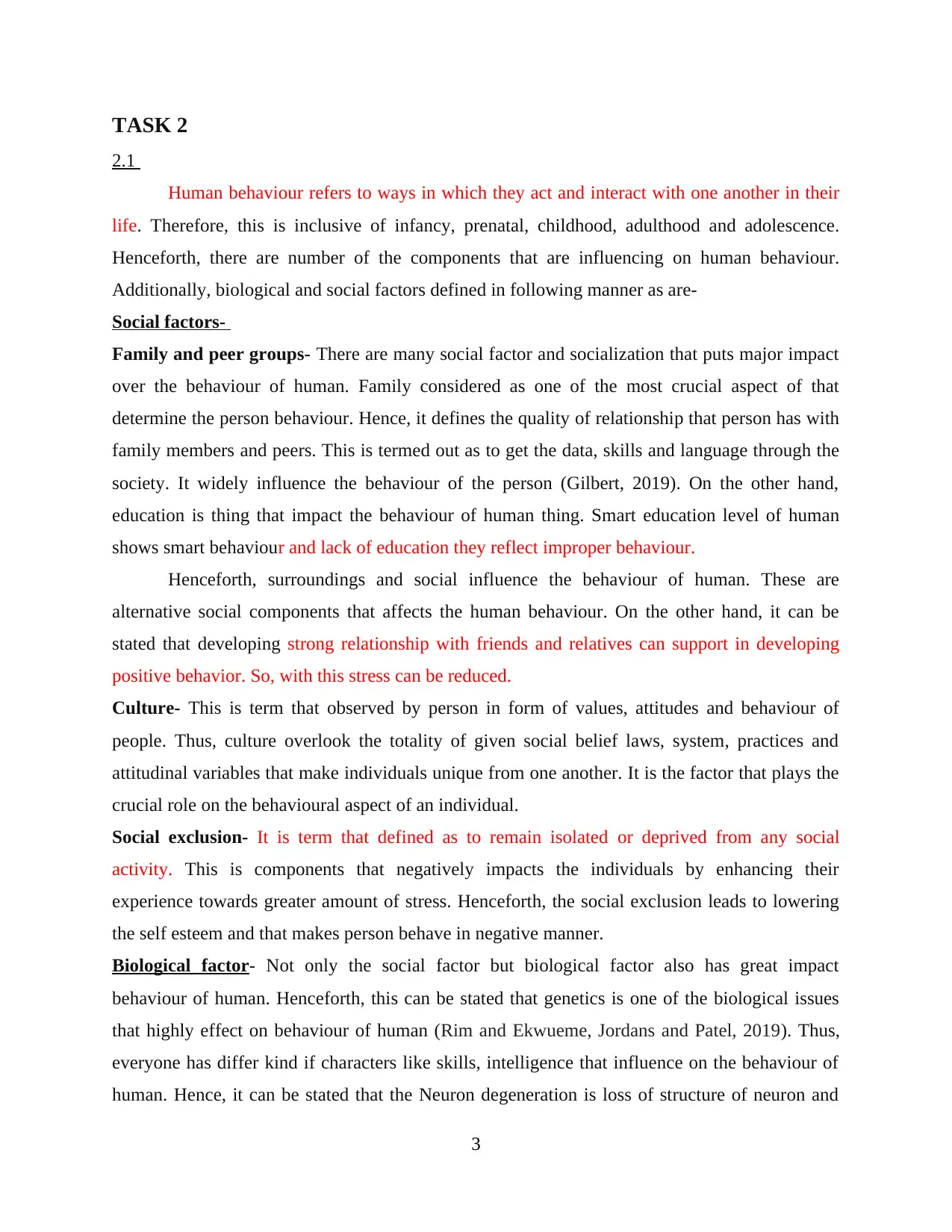
TASK 2
2.1
Human behaviour refers to ways in which they act and interact with one another in their
life. Therefore, this is inclusive of infancy, prenatal, childhood, adulthood and adolescence.
Henceforth, there are number of the components that are influencing on human behaviour.
Additionally, biological and social factors defined in following manner as are-
Social factors-
Family and peer groups- There are many social factor and socialization that puts major impact
over the behaviour of human. Family considered as one of the most crucial aspect of that
determine the person behaviour. Hence, it defines the quality of relationship that person has with
family members and peers. This is termed out as to get the data, skills and language through the
society. It widely influence the behaviour of the person (Gilbert, 2019). On the other hand,
education is thing that impact the behaviour of human thing. Smart education level of human
shows smart behaviour and lack of education they reflect improper behaviour.
Henceforth, surroundings and social influence the behaviour of human. These are
alternative social components that affects the human behaviour. On the other hand, it can be
stated that developing strong relationship with friends and relatives can support in developing
positive behavior. So, with this stress can be reduced.
Culture- This is term that observed by person in form of values, attitudes and behaviour of
people. Thus, culture overlook the totality of given social belief laws, system, practices and
attitudinal variables that make individuals unique from one another. It is the factor that plays the
crucial role on the behavioural aspect of an individual.
Social exclusion- It is term that defined as to remain isolated or deprived from any social
activity. This is components that negatively impacts the individuals by enhancing their
experience towards greater amount of stress. Henceforth, the social exclusion leads to lowering
the self esteem and that makes person behave in negative manner.
Biological factor- Not only the social factor but biological factor also has great impact
behaviour of human. Henceforth, this can be stated that genetics is one of the biological issues
that highly effect on behaviour of human (Rim and Ekwueme, Jordans and Patel, 2019). Thus,
everyone has differ kind if characters like skills, intelligence that influence on the behaviour of
human. Hence, it can be stated that the Neuron degeneration is loss of structure of neuron and
3
2.1
Human behaviour refers to ways in which they act and interact with one another in their
life. Therefore, this is inclusive of infancy, prenatal, childhood, adulthood and adolescence.
Henceforth, there are number of the components that are influencing on human behaviour.
Additionally, biological and social factors defined in following manner as are-
Social factors-
Family and peer groups- There are many social factor and socialization that puts major impact
over the behaviour of human. Family considered as one of the most crucial aspect of that
determine the person behaviour. Hence, it defines the quality of relationship that person has with
family members and peers. This is termed out as to get the data, skills and language through the
society. It widely influence the behaviour of the person (Gilbert, 2019). On the other hand,
education is thing that impact the behaviour of human thing. Smart education level of human
shows smart behaviour and lack of education they reflect improper behaviour.
Henceforth, surroundings and social influence the behaviour of human. These are
alternative social components that affects the human behaviour. On the other hand, it can be
stated that developing strong relationship with friends and relatives can support in developing
positive behavior. So, with this stress can be reduced.
Culture- This is term that observed by person in form of values, attitudes and behaviour of
people. Thus, culture overlook the totality of given social belief laws, system, practices and
attitudinal variables that make individuals unique from one another. It is the factor that plays the
crucial role on the behavioural aspect of an individual.
Social exclusion- It is term that defined as to remain isolated or deprived from any social
activity. This is components that negatively impacts the individuals by enhancing their
experience towards greater amount of stress. Henceforth, the social exclusion leads to lowering
the self esteem and that makes person behave in negative manner.
Biological factor- Not only the social factor but biological factor also has great impact
behaviour of human. Henceforth, this can be stated that genetics is one of the biological issues
that highly effect on behaviour of human (Rim and Ekwueme, Jordans and Patel, 2019). Thus,
everyone has differ kind if characters like skills, intelligence that influence on the behaviour of
human. Hence, it can be stated that the Neuron degeneration is loss of structure of neuron and
3
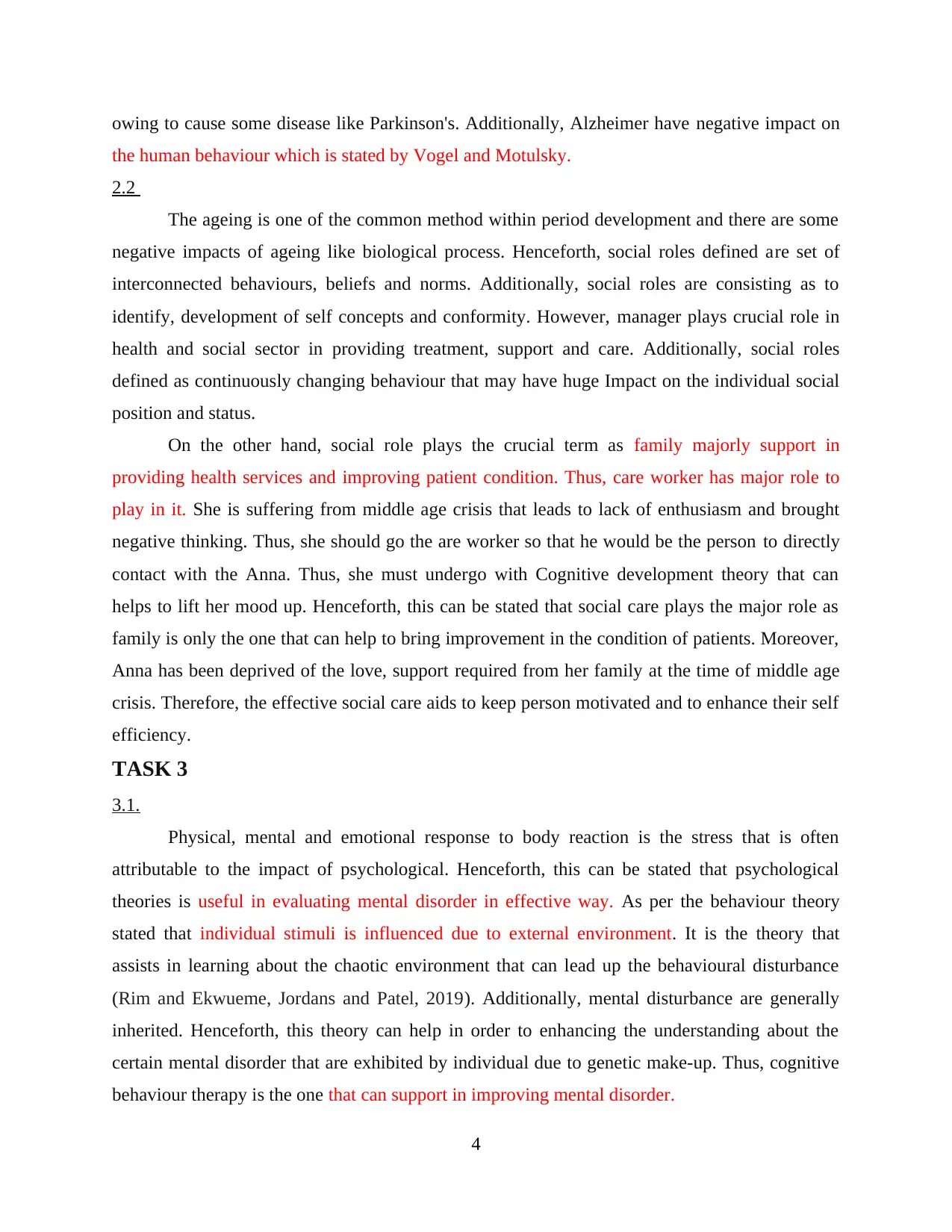
owing to cause some disease like Parkinson's. Additionally, Alzheimer have negative impact on
the human behaviour which is stated by Vogel and Motulsky.
2.2
The ageing is one of the common method within period development and there are some
negative impacts of ageing like biological process. Henceforth, social roles defined are set of
interconnected behaviours, beliefs and norms. Additionally, social roles are consisting as to
identify, development of self concepts and conformity. However, manager plays crucial role in
health and social sector in providing treatment, support and care. Additionally, social roles
defined as continuously changing behaviour that may have huge Impact on the individual social
position and status.
On the other hand, social role plays the crucial term as family majorly support in
providing health services and improving patient condition. Thus, care worker has major role to
play in it. She is suffering from middle age crisis that leads to lack of enthusiasm and brought
negative thinking. Thus, she should go the are worker so that he would be the person to directly
contact with the Anna. Thus, she must undergo with Cognitive development theory that can
helps to lift her mood up. Henceforth, this can be stated that social care plays the major role as
family is only the one that can help to bring improvement in the condition of patients. Moreover,
Anna has been deprived of the love, support required from her family at the time of middle age
crisis. Therefore, the effective social care aids to keep person motivated and to enhance their self
efficiency.
TASK 3
3.1.
Physical, mental and emotional response to body reaction is the stress that is often
attributable to the impact of psychological. Henceforth, this can be stated that psychological
theories is useful in evaluating mental disorder in effective way. As per the behaviour theory
stated that individual stimuli is influenced due to external environment. It is the theory that
assists in learning about the chaotic environment that can lead up the behavioural disturbance
(Rim and Ekwueme, Jordans and Patel, 2019). Additionally, mental disturbance are generally
inherited. Henceforth, this theory can help in order to enhancing the understanding about the
certain mental disorder that are exhibited by individual due to genetic make-up. Thus, cognitive
behaviour therapy is the one that can support in improving mental disorder.
4
the human behaviour which is stated by Vogel and Motulsky.
2.2
The ageing is one of the common method within period development and there are some
negative impacts of ageing like biological process. Henceforth, social roles defined are set of
interconnected behaviours, beliefs and norms. Additionally, social roles are consisting as to
identify, development of self concepts and conformity. However, manager plays crucial role in
health and social sector in providing treatment, support and care. Additionally, social roles
defined as continuously changing behaviour that may have huge Impact on the individual social
position and status.
On the other hand, social role plays the crucial term as family majorly support in
providing health services and improving patient condition. Thus, care worker has major role to
play in it. She is suffering from middle age crisis that leads to lack of enthusiasm and brought
negative thinking. Thus, she should go the are worker so that he would be the person to directly
contact with the Anna. Thus, she must undergo with Cognitive development theory that can
helps to lift her mood up. Henceforth, this can be stated that social care plays the major role as
family is only the one that can help to bring improvement in the condition of patients. Moreover,
Anna has been deprived of the love, support required from her family at the time of middle age
crisis. Therefore, the effective social care aids to keep person motivated and to enhance their self
efficiency.
TASK 3
3.1.
Physical, mental and emotional response to body reaction is the stress that is often
attributable to the impact of psychological. Henceforth, this can be stated that psychological
theories is useful in evaluating mental disorder in effective way. As per the behaviour theory
stated that individual stimuli is influenced due to external environment. It is the theory that
assists in learning about the chaotic environment that can lead up the behavioural disturbance
(Rim and Ekwueme, Jordans and Patel, 2019). Additionally, mental disturbance are generally
inherited. Henceforth, this theory can help in order to enhancing the understanding about the
certain mental disorder that are exhibited by individual due to genetic make-up. Thus, cognitive
behaviour therapy is the one that can support in improving mental disorder.
4
⊘ This is a preview!⊘
Do you want full access?
Subscribe today to unlock all pages.

Trusted by 1+ million students worldwide
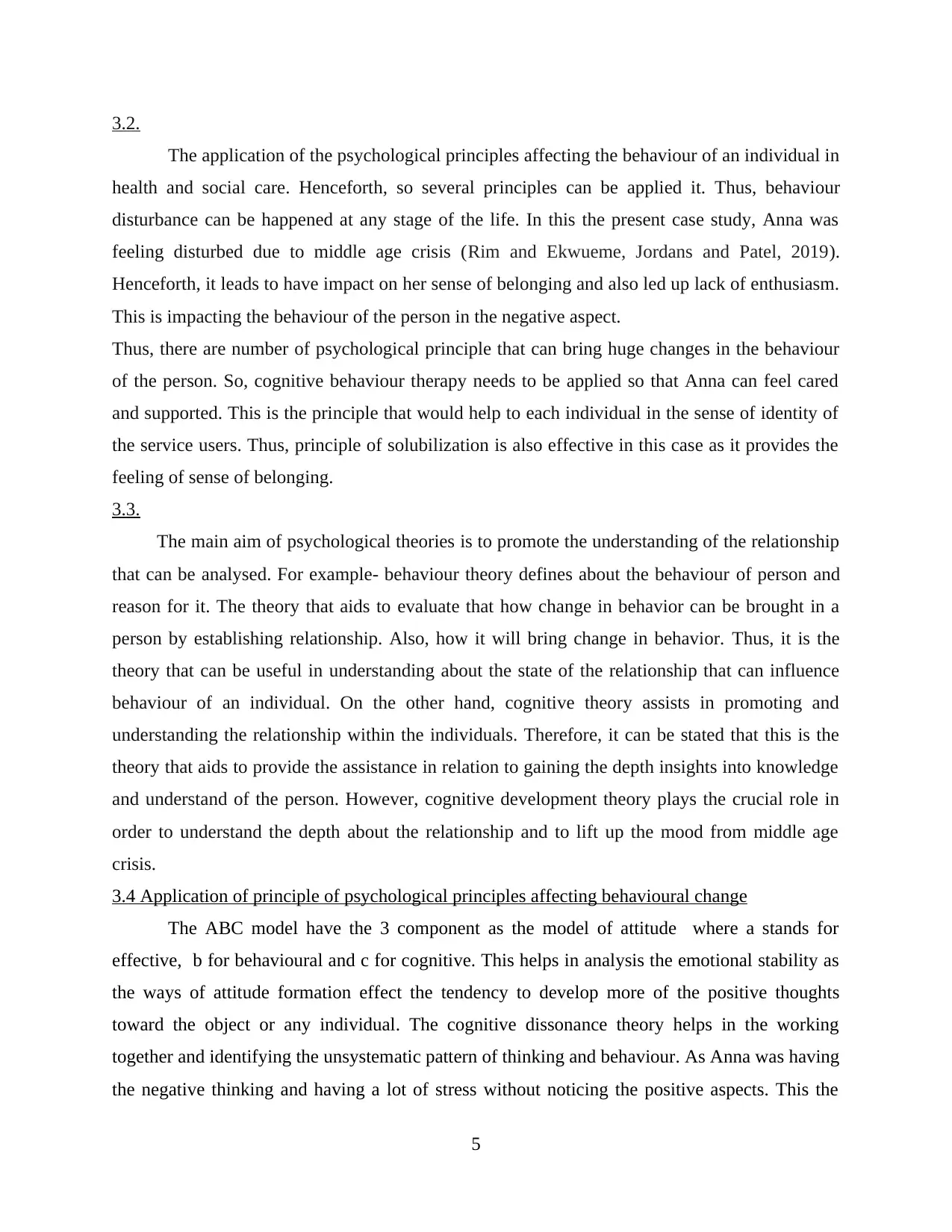
3.2.
The application of the psychological principles affecting the behaviour of an individual in
health and social care. Henceforth, so several principles can be applied it. Thus, behaviour
disturbance can be happened at any stage of the life. In this the present case study, Anna was
feeling disturbed due to middle age crisis (Rim and Ekwueme, Jordans and Patel, 2019).
Henceforth, it leads to have impact on her sense of belonging and also led up lack of enthusiasm.
This is impacting the behaviour of the person in the negative aspect.
Thus, there are number of psychological principle that can bring huge changes in the behaviour
of the person. So, cognitive behaviour therapy needs to be applied so that Anna can feel cared
and supported. This is the principle that would help to each individual in the sense of identity of
the service users. Thus, principle of solubilization is also effective in this case as it provides the
feeling of sense of belonging.
3.3.
The main aim of psychological theories is to promote the understanding of the relationship
that can be analysed. For example- behaviour theory defines about the behaviour of person and
reason for it. The theory that aids to evaluate that how change in behavior can be brought in a
person by establishing relationship. Also, how it will bring change in behavior. Thus, it is the
theory that can be useful in understanding about the state of the relationship that can influence
behaviour of an individual. On the other hand, cognitive theory assists in promoting and
understanding the relationship within the individuals. Therefore, it can be stated that this is the
theory that aids to provide the assistance in relation to gaining the depth insights into knowledge
and understand of the person. However, cognitive development theory plays the crucial role in
order to understand the depth about the relationship and to lift up the mood from middle age
crisis.
3.4 Application of principle of psychological principles affecting behavioural change
The ABC model have the 3 component as the model of attitude where a stands for
effective, b for behavioural and c for cognitive. This helps in analysis the emotional stability as
the ways of attitude formation effect the tendency to develop more of the positive thoughts
toward the object or any individual. The cognitive dissonance theory helps in the working
together and identifying the unsystematic pattern of thinking and behaviour. As Anna was having
the negative thinking and having a lot of stress without noticing the positive aspects. This the
5
The application of the psychological principles affecting the behaviour of an individual in
health and social care. Henceforth, so several principles can be applied it. Thus, behaviour
disturbance can be happened at any stage of the life. In this the present case study, Anna was
feeling disturbed due to middle age crisis (Rim and Ekwueme, Jordans and Patel, 2019).
Henceforth, it leads to have impact on her sense of belonging and also led up lack of enthusiasm.
This is impacting the behaviour of the person in the negative aspect.
Thus, there are number of psychological principle that can bring huge changes in the behaviour
of the person. So, cognitive behaviour therapy needs to be applied so that Anna can feel cared
and supported. This is the principle that would help to each individual in the sense of identity of
the service users. Thus, principle of solubilization is also effective in this case as it provides the
feeling of sense of belonging.
3.3.
The main aim of psychological theories is to promote the understanding of the relationship
that can be analysed. For example- behaviour theory defines about the behaviour of person and
reason for it. The theory that aids to evaluate that how change in behavior can be brought in a
person by establishing relationship. Also, how it will bring change in behavior. Thus, it is the
theory that can be useful in understanding about the state of the relationship that can influence
behaviour of an individual. On the other hand, cognitive theory assists in promoting and
understanding the relationship within the individuals. Therefore, it can be stated that this is the
theory that aids to provide the assistance in relation to gaining the depth insights into knowledge
and understand of the person. However, cognitive development theory plays the crucial role in
order to understand the depth about the relationship and to lift up the mood from middle age
crisis.
3.4 Application of principle of psychological principles affecting behavioural change
The ABC model have the 3 component as the model of attitude where a stands for
effective, b for behavioural and c for cognitive. This helps in analysis the emotional stability as
the ways of attitude formation effect the tendency to develop more of the positive thoughts
toward the object or any individual. The cognitive dissonance theory helps in the working
together and identifying the unsystematic pattern of thinking and behaviour. As Anna was having
the negative thinking and having a lot of stress without noticing the positive aspects. This the
5
Paraphrase This Document
Need a fresh take? Get an instant paraphrase of this document with our AI Paraphraser
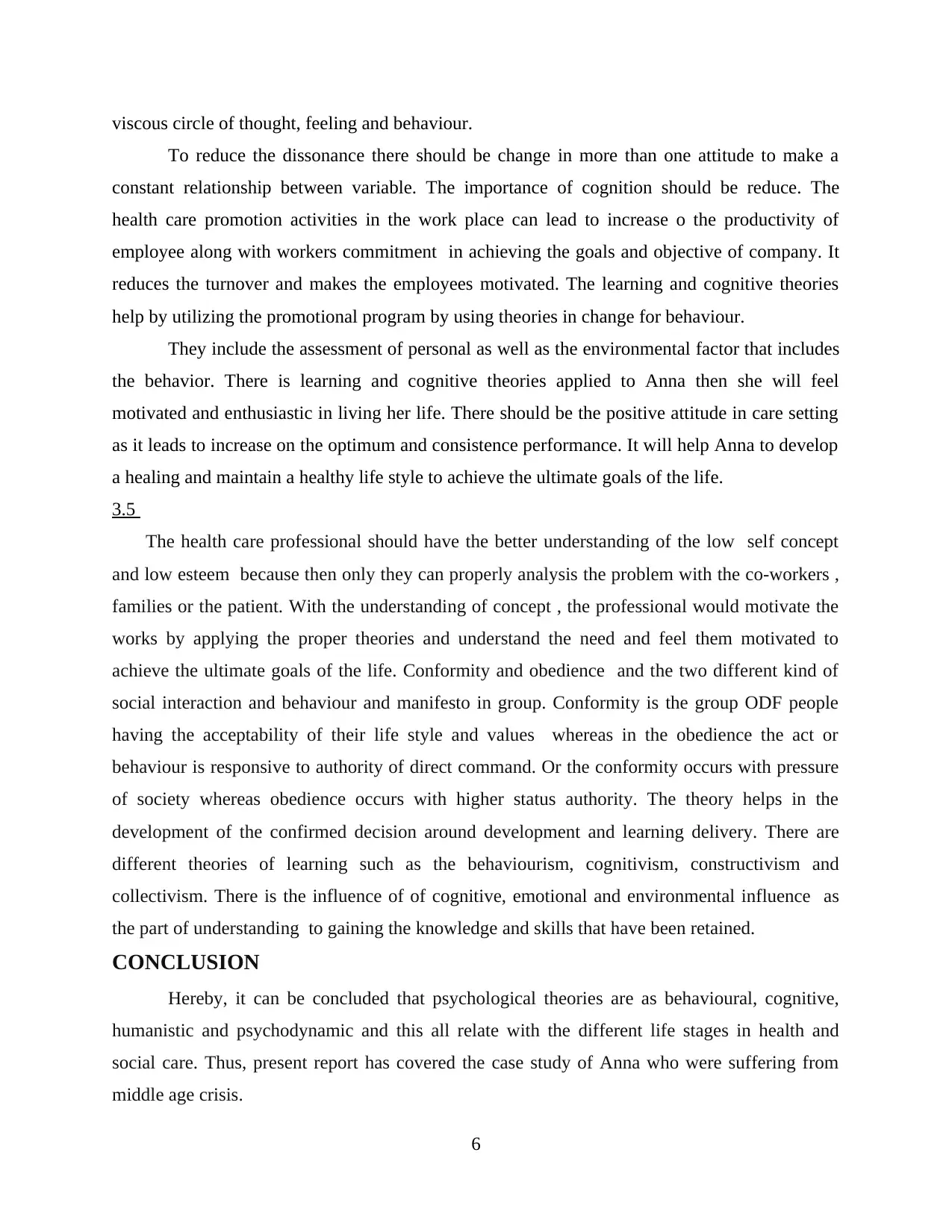
viscous circle of thought, feeling and behaviour.
To reduce the dissonance there should be change in more than one attitude to make a
constant relationship between variable. The importance of cognition should be reduce. The
health care promotion activities in the work place can lead to increase o the productivity of
employee along with workers commitment in achieving the goals and objective of company. It
reduces the turnover and makes the employees motivated. The learning and cognitive theories
help by utilizing the promotional program by using theories in change for behaviour.
They include the assessment of personal as well as the environmental factor that includes
the behavior. There is learning and cognitive theories applied to Anna then she will feel
motivated and enthusiastic in living her life. There should be the positive attitude in care setting
as it leads to increase on the optimum and consistence performance. It will help Anna to develop
a healing and maintain a healthy life style to achieve the ultimate goals of the life.
3.5
The health care professional should have the better understanding of the low self concept
and low esteem because then only they can properly analysis the problem with the co-workers ,
families or the patient. With the understanding of concept , the professional would motivate the
works by applying the proper theories and understand the need and feel them motivated to
achieve the ultimate goals of the life. Conformity and obedience and the two different kind of
social interaction and behaviour and manifesto in group. Conformity is the group ODF people
having the acceptability of their life style and values whereas in the obedience the act or
behaviour is responsive to authority of direct command. Or the conformity occurs with pressure
of society whereas obedience occurs with higher status authority. The theory helps in the
development of the confirmed decision around development and learning delivery. There are
different theories of learning such as the behaviourism, cognitivism, constructivism and
collectivism. There is the influence of of cognitive, emotional and environmental influence as
the part of understanding to gaining the knowledge and skills that have been retained.
CONCLUSION
Hereby, it can be concluded that psychological theories are as behavioural, cognitive,
humanistic and psychodynamic and this all relate with the different life stages in health and
social care. Thus, present report has covered the case study of Anna who were suffering from
middle age crisis.
6
To reduce the dissonance there should be change in more than one attitude to make a
constant relationship between variable. The importance of cognition should be reduce. The
health care promotion activities in the work place can lead to increase o the productivity of
employee along with workers commitment in achieving the goals and objective of company. It
reduces the turnover and makes the employees motivated. The learning and cognitive theories
help by utilizing the promotional program by using theories in change for behaviour.
They include the assessment of personal as well as the environmental factor that includes
the behavior. There is learning and cognitive theories applied to Anna then she will feel
motivated and enthusiastic in living her life. There should be the positive attitude in care setting
as it leads to increase on the optimum and consistence performance. It will help Anna to develop
a healing and maintain a healthy life style to achieve the ultimate goals of the life.
3.5
The health care professional should have the better understanding of the low self concept
and low esteem because then only they can properly analysis the problem with the co-workers ,
families or the patient. With the understanding of concept , the professional would motivate the
works by applying the proper theories and understand the need and feel them motivated to
achieve the ultimate goals of the life. Conformity and obedience and the two different kind of
social interaction and behaviour and manifesto in group. Conformity is the group ODF people
having the acceptability of their life style and values whereas in the obedience the act or
behaviour is responsive to authority of direct command. Or the conformity occurs with pressure
of society whereas obedience occurs with higher status authority. The theory helps in the
development of the confirmed decision around development and learning delivery. There are
different theories of learning such as the behaviourism, cognitivism, constructivism and
collectivism. There is the influence of of cognitive, emotional and environmental influence as
the part of understanding to gaining the knowledge and skills that have been retained.
CONCLUSION
Hereby, it can be concluded that psychological theories are as behavioural, cognitive,
humanistic and psychodynamic and this all relate with the different life stages in health and
social care. Thus, present report has covered the case study of Anna who were suffering from
middle age crisis.
6
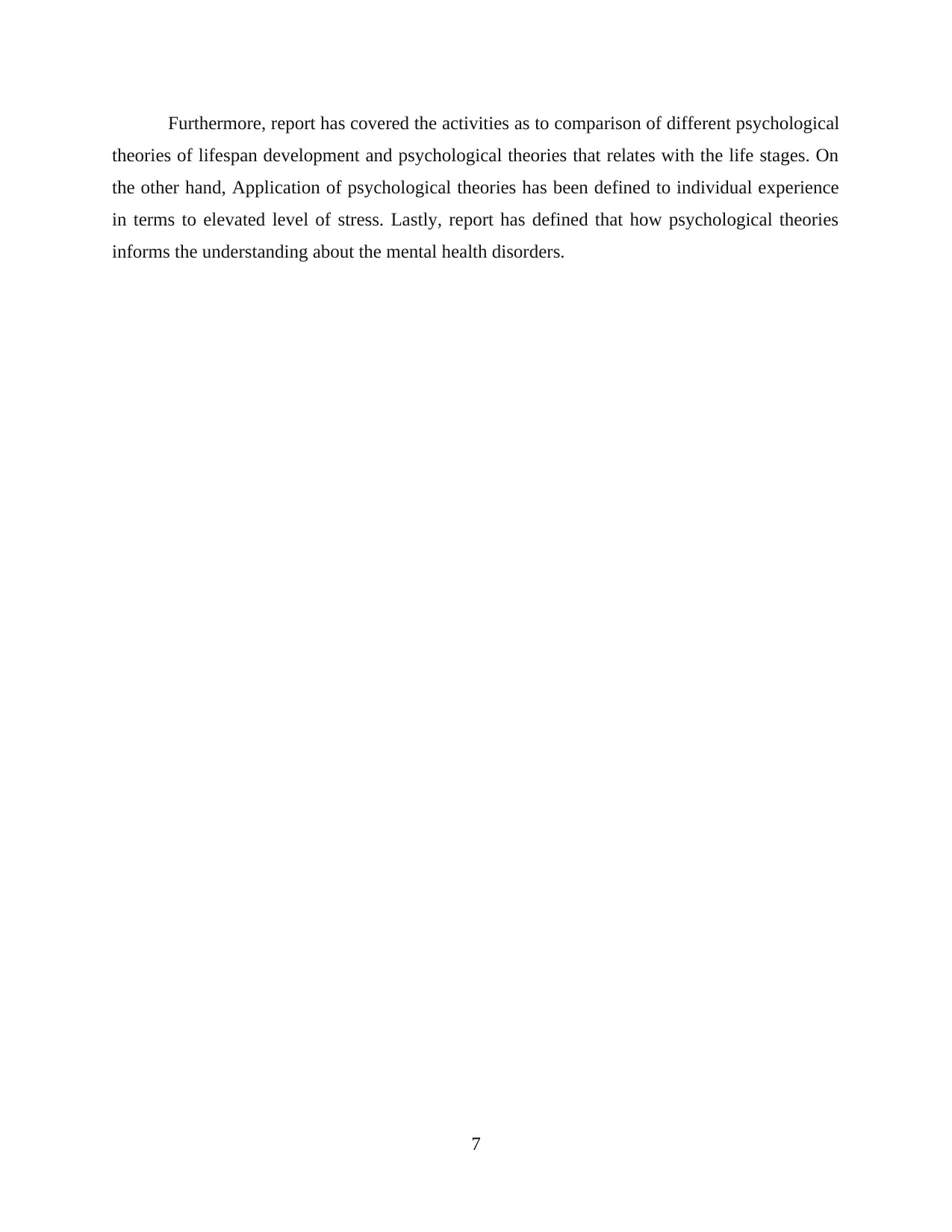
Furthermore, report has covered the activities as to comparison of different psychological
theories of lifespan development and psychological theories that relates with the life stages. On
the other hand, Application of psychological theories has been defined to individual experience
in terms to elevated level of stress. Lastly, report has defined that how psychological theories
informs the understanding about the mental health disorders.
7
theories of lifespan development and psychological theories that relates with the life stages. On
the other hand, Application of psychological theories has been defined to individual experience
in terms to elevated level of stress. Lastly, report has defined that how psychological theories
informs the understanding about the mental health disorders.
7
⊘ This is a preview!⊘
Do you want full access?
Subscribe today to unlock all pages.

Trusted by 1+ million students worldwide
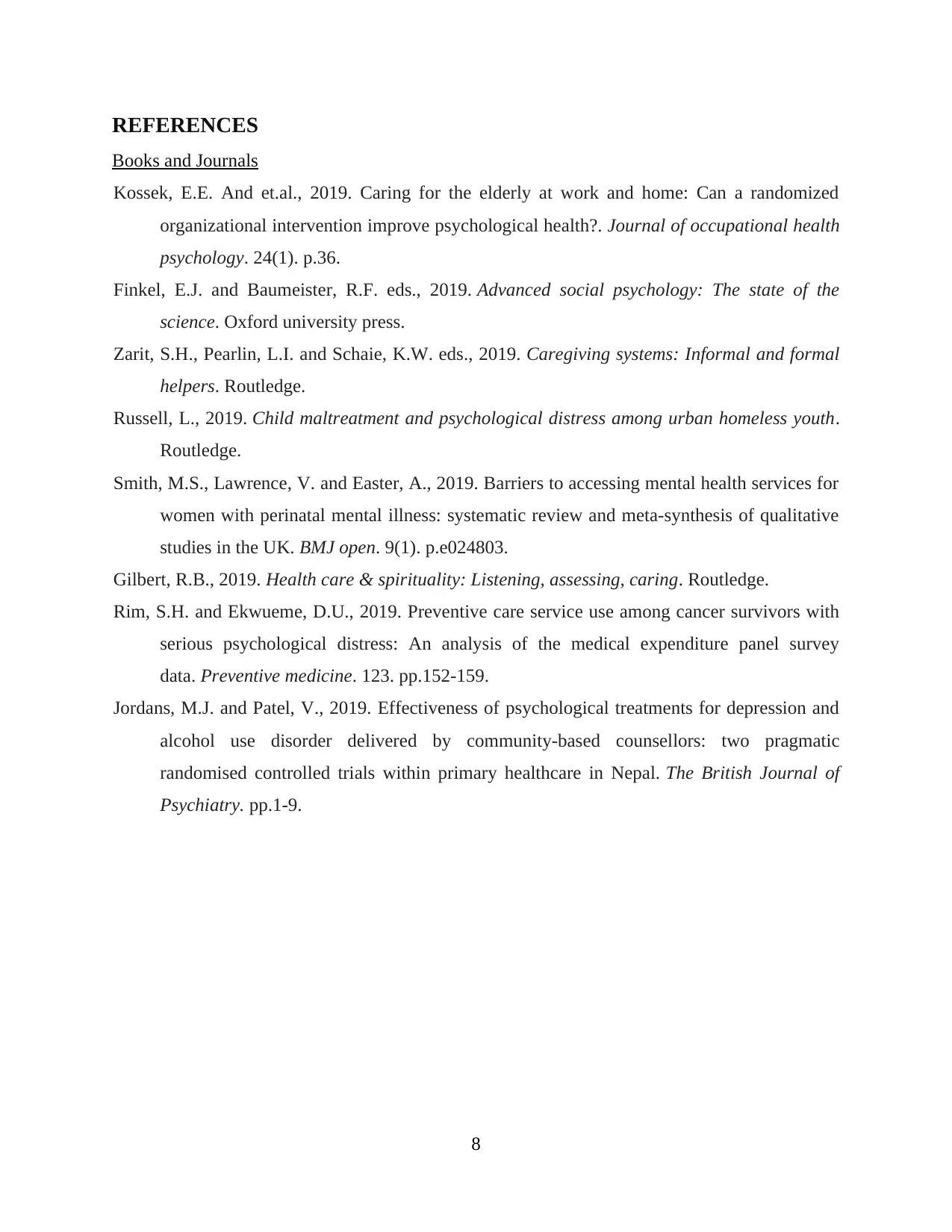
REFERENCES
Books and Journals
Kossek, E.E. And et.al., 2019. Caring for the elderly at work and home: Can a randomized
organizational intervention improve psychological health?. Journal of occupational health
psychology. 24(1). p.36.
Finkel, E.J. and Baumeister, R.F. eds., 2019. Advanced social psychology: The state of the
science. Oxford university press.
Zarit, S.H., Pearlin, L.I. and Schaie, K.W. eds., 2019. Caregiving systems: Informal and formal
helpers. Routledge.
Russell, L., 2019. Child maltreatment and psychological distress among urban homeless youth.
Routledge.
Smith, M.S., Lawrence, V. and Easter, A., 2019. Barriers to accessing mental health services for
women with perinatal mental illness: systematic review and meta-synthesis of qualitative
studies in the UK. BMJ open. 9(1). p.e024803.
Gilbert, R.B., 2019. Health care & spirituality: Listening, assessing, caring. Routledge.
Rim, S.H. and Ekwueme, D.U., 2019. Preventive care service use among cancer survivors with
serious psychological distress: An analysis of the medical expenditure panel survey
data. Preventive medicine. 123. pp.152-159.
Jordans, M.J. and Patel, V., 2019. Effectiveness of psychological treatments for depression and
alcohol use disorder delivered by community-based counsellors: two pragmatic
randomised controlled trials within primary healthcare in Nepal. The British Journal of
Psychiatry. pp.1-9.
8
Books and Journals
Kossek, E.E. And et.al., 2019. Caring for the elderly at work and home: Can a randomized
organizational intervention improve psychological health?. Journal of occupational health
psychology. 24(1). p.36.
Finkel, E.J. and Baumeister, R.F. eds., 2019. Advanced social psychology: The state of the
science. Oxford university press.
Zarit, S.H., Pearlin, L.I. and Schaie, K.W. eds., 2019. Caregiving systems: Informal and formal
helpers. Routledge.
Russell, L., 2019. Child maltreatment and psychological distress among urban homeless youth.
Routledge.
Smith, M.S., Lawrence, V. and Easter, A., 2019. Barriers to accessing mental health services for
women with perinatal mental illness: systematic review and meta-synthesis of qualitative
studies in the UK. BMJ open. 9(1). p.e024803.
Gilbert, R.B., 2019. Health care & spirituality: Listening, assessing, caring. Routledge.
Rim, S.H. and Ekwueme, D.U., 2019. Preventive care service use among cancer survivors with
serious psychological distress: An analysis of the medical expenditure panel survey
data. Preventive medicine. 123. pp.152-159.
Jordans, M.J. and Patel, V., 2019. Effectiveness of psychological treatments for depression and
alcohol use disorder delivered by community-based counsellors: two pragmatic
randomised controlled trials within primary healthcare in Nepal. The British Journal of
Psychiatry. pp.1-9.
8
1 out of 10
Related Documents
Your All-in-One AI-Powered Toolkit for Academic Success.
+13062052269
info@desklib.com
Available 24*7 on WhatsApp / Email
![[object Object]](/_next/static/media/star-bottom.7253800d.svg)
Unlock your academic potential
Copyright © 2020–2025 A2Z Services. All Rights Reserved. Developed and managed by ZUCOL.





